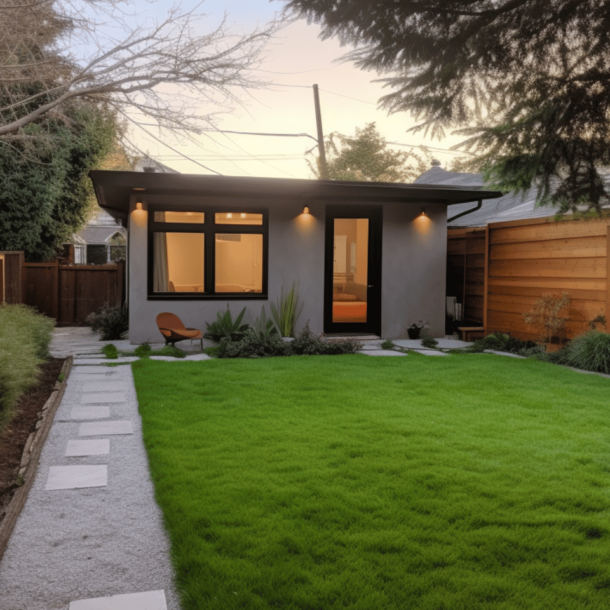
Maximizing Your Property’s ROI with a Garden Suite: A Step-by-Step Guide
Maximizing Your Property’s ROI with a Garden Suite: A Step-by-Step Guide
Homeowners are continuously seeking novel ways to raise the value of their properties and maximize their return on investment (ROI) in today’s real estate market. The inclusion of a garden suite is one strategy that is becoming increasingly beneficial. A garden suite is a self-contained living area constructed on your property, also referred to as a granny flat, in-law suite, or backyard cottage. In addition to adding living space, it can also raise the overall value of your property or generate rental income. If you’re considering renovating your garden house in Brampton, feel free to contact Emerald Builders. They offer numerous high-quality services in the Greater Toronto Area, including designing, building custom homes, and interior decorating.
This step-by-step manual will show you how to add a garden suite to your property to increase its return on investment.
Planning and Research
The first step in building a garden suite is to conduct a comprehensive investigation of the local ordinances and zoning rules in your region. The rules and requirements for the construction and use of auxiliary dwelling units vary among communities. To learn more about the precise rules you must abide by, contact your community’s planning department.
The layout and design of your garden suite should also be thoroughly thought out. Take into account elements including size, location, and architectural design. Make sure your design offers privacy for both the main home and the garden suite while blending in with the existing aesthetics of your property.
Investment and Finance
Consider your financing choices while you have a budget in place. You might borrow against the equity in your home if you don’t have enough cash, or you could use your savings. It’s essential to remember that while the initial expenditure may be significant, it is justified by the prospective reward. You should also research any local grants, subsidies, or tax incentives that may be available for auxiliary housing units. Homeowners who build affordable housing options may be eligible for cash incentives in some areas.
Restrictions and Construction Permits
Before initiating building, you must obtain the required permits and follow local laws. This frequently entails submitting thorough designs and going through inspections to ensure the project complies with zoning and building code requirements. Work collaboratively with your local government and employ experts who know about garden suite projects, such as architects or contractors. They can assist you with the application procedure and ensure your project complies with all legal standards.
Making a Budget
It’s crucial to establish your budget. Depending on elements like size, materials, and local labor rates, garden suite prices might vary widely. Don’t forget to account for interior furnishings, utility connections, and landscaping fees. And permit charges in your budget in addition to building costs. With the help of a financial advisor or a real estate specialist, you can build a reasonable budget that takes into consideration your long-term financial goals and potential ROI.
Strategy for Marketing and Bookings
When your garden suite is finished, you can begin enjoying the benefits of your investment. An efficient marketing and rental strategy will assist you in getting the highest return on investment, regardless of whether you intend to rent it out or use it for personal use.
Promote your garden suite using online resources, real estate professionals, or regional rental websites. Make sure to properly price it and highlight any special qualities. An attractively advertised and well-maintained garden suite is more likely to have a high return on investment.
Aesthetics and Amenities
The ROI of your garden suite can be greatly increased through landscaping. Your home’s aesthetic appeal and practicality can both be greatly enhanced by a well-planned garden or outdoor area. To improve the entire experience for your tenants and yourself, think about incorporating amenities like a patio, deck, or garden.
Development
Your garden suite’s design develops during the construction stage. Coordination, communication, and close attention to detail are crucial throughout this stage. Hire skilled architects, builders, and contractors to help you realize your design.
During construction, be ready for unforeseen problems that could occur, such as unexpected structural difficulties or weather delays. Potential setbacks may be lessened with the use of a contingency budget.
Upkeep and Routine Maintenance
Regular upkeep is essential to keeping your property attractive and valuable. Maintaining the condition of both your garden suite and the main house requires periodic inspections, swift resolution of any difficulties, and the installation of any necessary modifications.
Management of Property
If you choose to rent out your garden suite, you might want to think about working with a property management company to handle the day-to-day duties of running the rental. This includes conducting tenant screening, managing maintenance and repairs, and maintaining a convenient and successful renting experience. A good investment that may underestimate your stress and save you time is property management.
Assess and Make Changes
Evaluate the effectiveness of your garden suite frequently as you strive to maximize your ROI. To respond to shifting market conditions and boost your income, assume modifying your rental rates, marketing plans, and facilities.
Conclusion
With advantages for both you and your property’s bottom line, a garden suite in Brampton can be a worthwhile investment. You can increase your property’s return on investment (ROI) and benefit from this flexible investment with careful planning, budgeting, and respect for local laws. A well-designed and well-maintained garden home in Brampton is a wise decision for homeowners trying to get the most out of their real estate investments, whether they decide to rent it out or utilize it for personal uses.
Quick links
Head Office and Design Center
Operating Hours
Monday to Friday : 9AM – 6PM
Saturday : 10AM – 5PM
Sunday : By appointment only


